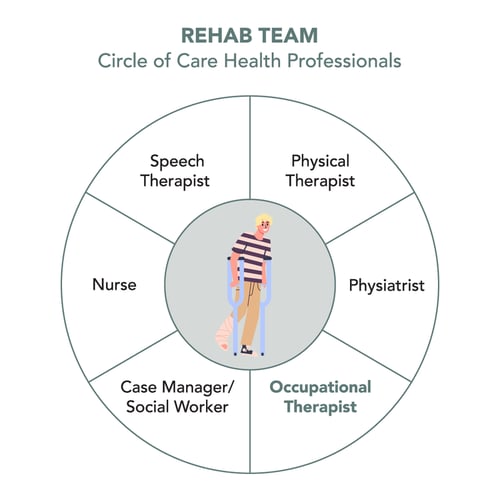3 min read
Effective healthcare is a team effort: Meet your rehab team
Shae Bouchard : Updated on July 3, 2025

Experiencing a hospitalization, either as a patient or as a family member, can be overwhelming and confusing. Unfortunately, many people continue to navigate the healthcare system with minimal guidance and less family support communication due to visitor limitations during the COVID pandemic and hospital staffing pressures.
Effective healthcare is a team effort
Clear communication is key and it is important to learn who is on your healthcare team when you are admitted to the hospital. The members of your team will interact with you on a daily basis to establish your hospital care plan and then prepare your discharge plan for a successful transition home.
Some members of your healthcare team become more involved as you improve and progress through your hospital stay. A good discharge from the hospital to home requires the clear transfer of information from healthcare clinicians to the patient and family to prevent problems at home. The purpose of a good discharge plan is to ensure your transition from the hospital to another medical facility or to your home is as safe and smooth as possible.
Planning to transition home when you will need to use a wheelchair and the accessibility of your home may first be raised by your rehab team. That’s when the lease or purchase of a WheelPad® accessible home attachment may first be mentioned. But who or what is a rehab team?
What is rehab?
According to MedlinePLus.gov, “Rehabilitation is care that can help you get back, keep, or improve abilities that you need for daily life. You may have lost them because of a disease or injury, or as a side effect from a medical treatment.” Rehab is the shortened term used by most people to describe this type of specialized medical care.
Your rehab team is a multidisciplinary group of medical professionals who specialize in helping you improve your ability to live independently.
Your rehab team members

Here are some of the key members of your rehab healthcare team:
Physician: Physicians are ultimately responsible for all the clinical decisions regarding your care. They will prescribe medications, treatments, order tests, and coordinate care with your other team members. Other terms you may hear are hospitalist (practice solely in hospital environments), internist (practice in both hospital and outpatient settings) or physiatrist (specialize in physical medicine and rehabilitation and the functioning of the whole patient, as compared with a focus on a specific system). You may also have residents (physicians who have finished medical school and are receiving training in a specialized area) or fellows (a board-certified physician who has finished residency training and is pursuing more specialized training in their area of interest) on your team.
Nursing: Nurses provide 24-hour care to administer medications, monitor your progress, and educate you about your condition. They communicate with the physician to modify your treatment plan as needed. While in the hospital, most of your interactions will likely be with the nursing staff, and they will collect much of the information your physician uses to make a diagnosis.
Social Worker: Social workers collaborate with patients and their families to navigate the larger healthcare system, facilitate adjustment to new diagnoses, and help identify resources needed for a safe discharge. They can function as care coordinators and advocate to ensure each patients’ unique needs are considered. They help the rest of the team to consider the psychosocial needs of the patient, and may offer mental health support.
Physical Therapist (PT): PTs will address strength, range of motion, and balance problems. They will teach you how to use assistive devices like crutches, a walker, or a wheelchair. They will teach you exercises to improve your independence.
Occupational Therapist (OT): OTs will focus on your ability to complete activities of daily living (ADLs), including bathing, dressing, grooming and eating. They also may train you with equipment that will help you better perform these activities.
Speech Language Pathologist (SLP): Also called speech therapists, SLPs will work on your ability to communicate, problem-solve and reason, and address any problems with swallowing. They also evaluate swallowing function and will make recommendations about food consistency to make sure you are safe when eating.
Certified Nursing Assistants (CNA): CNAs are responsible for assisting patients with day-to-day tasks under the supervision of nursing staff, including turning or moving patients, assisting with bathing, grooming, dressing, and feeding, and taking vital signs for the medical staff.
What you and your family can do
Remember that you and your family need to be an active part of the team. Without your participation — by expressing how you feel, asking questions if something is unclear, or probing for more information and resources — your rehab team cannot function optimally. Build on your shared interest in helping you to live as independently as possible!